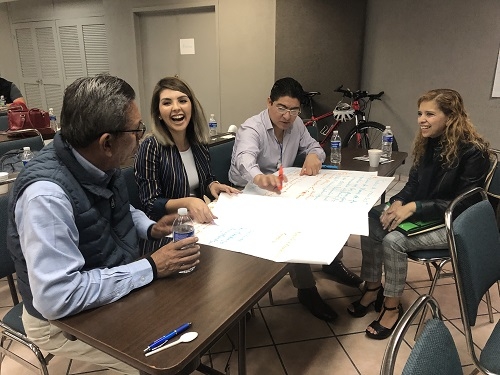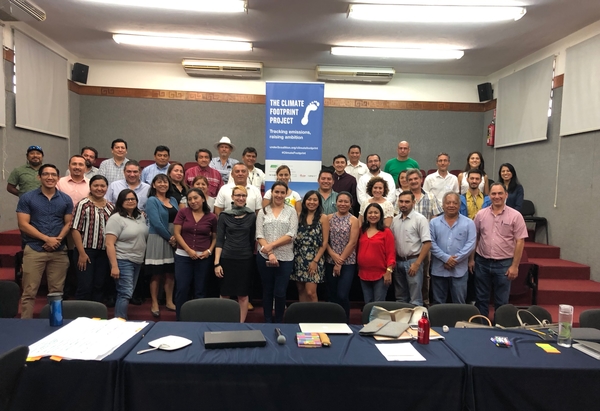Three states in Mexico: Yucatán, Jalisco, and Baja California. The first, a tourist hotspot in an ancient Mayan peninsula, which separates the Gulf of Mexico from the Caribbean Sea. The second is one of the most important states in Mexico, due to its natural resources, history and culture, and birth-place of the national liquor, tequila. The third shares a large, busy, and notorious border crossing with California, the wealthiest state in the United States, influential climate leader, and co-founder of the Under2 Coalition.
Together, they contribute to approximately 14% of Mexico’s Gross Domestic Product (GDP) (USD $170 billion) and represent 10% of its population (13.5 million people). All three states are signatories to the Under2 Memorandum of Understanding (MOU), and are committed to keeping global temperature rises to well below 2°C. They are also part of a new initiative led by The Climate Group, under our Transparency workstream.
The Climate Footprint Project, or Proyecto de Huella Climática in Spanish, provides direct support and training to seven state and regional governments across four countries – Brazil, India, Mexico, and South Africa – to improve their greenhouse gas (GHG) emissions tracking and reduction efforts. Regional GHG inventories provide the level of detail needed to allow local policymakers to understand their emission sources and trends to enhance the design of their emissions reduction strategies. The project is being delivered in coordination with the following consortium partners: Ricardo Energy and Environment, ICLEI – Local Governments for Sustainability, Greenhouse Gas Management Institute and CDP.
STOCKTAKING MISSIONS
To understand the capacity building needs in each state, a series of stocktaking missions were held in Mexico this past month, with the Secretariat of Sustainable Development (SDS) in Yucatán, the Secretariat of Environment and Territorial Development (SEMADET) in Jalisco, and the Secretariat of Environmental Protection (SPA) in Baja California. The missions, organised by Ricardo, our technical partner for this project, and local partner, Carbon Trust Mexico, were designed to assess the status of each state’s GHG inventory, and Measuring, Reporting and Verification (MRV) system for mitigation actions.
Two-day workshops were organised, bringing together between 25 and 40 key stakeholders in each state involved in these processes, including representatives from relevant sectoral departments (for example, Agriculture, Forestry, and Other Land Use (AFOLU), Energy, Waste), and also in the case of Jalisco, secretariats that are not often included in discussions on climate change mitigation (such as, Culture), industry, academia, and municipalities.
A simple ice-breaking exercise at the start of each workshop asking how many years participants have been working in climate change, and how many in MRV, revealed varying levels of knowledge and experience, often at the lower spectrum of 0-3 years. Anticipating this, the first day of the workshop covered capacity building sessions on MRV of emissions and mitigation actions, to ensure all participants were on the same page.
The second day honed in on the key MRV challenges, gaps, risks and opportunities identified in each state through desk research and interviews with key stakeholders prior to the missions, and made suggestions for tailored capacity building support that could be provided. Draft technical assistance roadmaps, for the coming year, were presented and discussed with the participants. These are currently being finalised and further validated by the respective state governments, in preparation for the technical assistance phase of the project that will begin in May 2019.
Overall, the project has got off to a promising start in Mexico. There was a high level of engagement and commitment from participants; and positive feedback and political buy-in from the state governments, as highlighted in the following news bulletins from Yucatán and Baja California (and forthcoming from Jalisco).

WHAT’S NEXT
While each state is at a different stage in its MRV development and has differing levels of resources, the technical assistance that Ricardo and Carbon Trust Mexico will provide through theoretical training and practical support will enable each state, depending on their priorities, to:
- increase their ability to regularly compile a state level GHG inventory in a consistent manner;
- develop a quality state level GHG inventory;
- and increase their ability to track mitigation progress.
Robust, regular, and high quality GHG inventories will not only support state governments to make more informed decisions on policies for cutting emissions, it will also help them to demonstrate their contribution to national government targets – another key objective of this project.

MEXICO AND BEYOND
Mexico is a national endorser of the Under2 Coalition. Furthermore, an impressive 15 out of Mexico’s 31 states are members of the Under2 Coalition, in addition to the federal entity, Mexico City. There is much scope, and also interest from the participants of the stocktaking missions, to share lessons and best practice among other Under2 Coalition members within the country, and those states that are yet to join the coalition, to scale up the impact of the project.
There is also great potential through the peer learning phase that The Climate Group will later lead on, to share lessons beyond the Mexican borders – firstly with fellow project country, Brazil; and internationally, among states and regions in the Under2 Coalition facing similar challenges and needs in their MRV systems.
The Climate Footprint Project is funded by a generous grant from the German government, as part of their International Climate Initiative (IKI), which encourages its large portfolio of global climate and biodiversity projects to explore synergies. The Climate Group and our consortium partners look forward to learning from these projects, and contributing to the knowledge exchange around tracking emissions and raising ambition, as the tagline of this project promises to imprint on its journey over the next two years.
